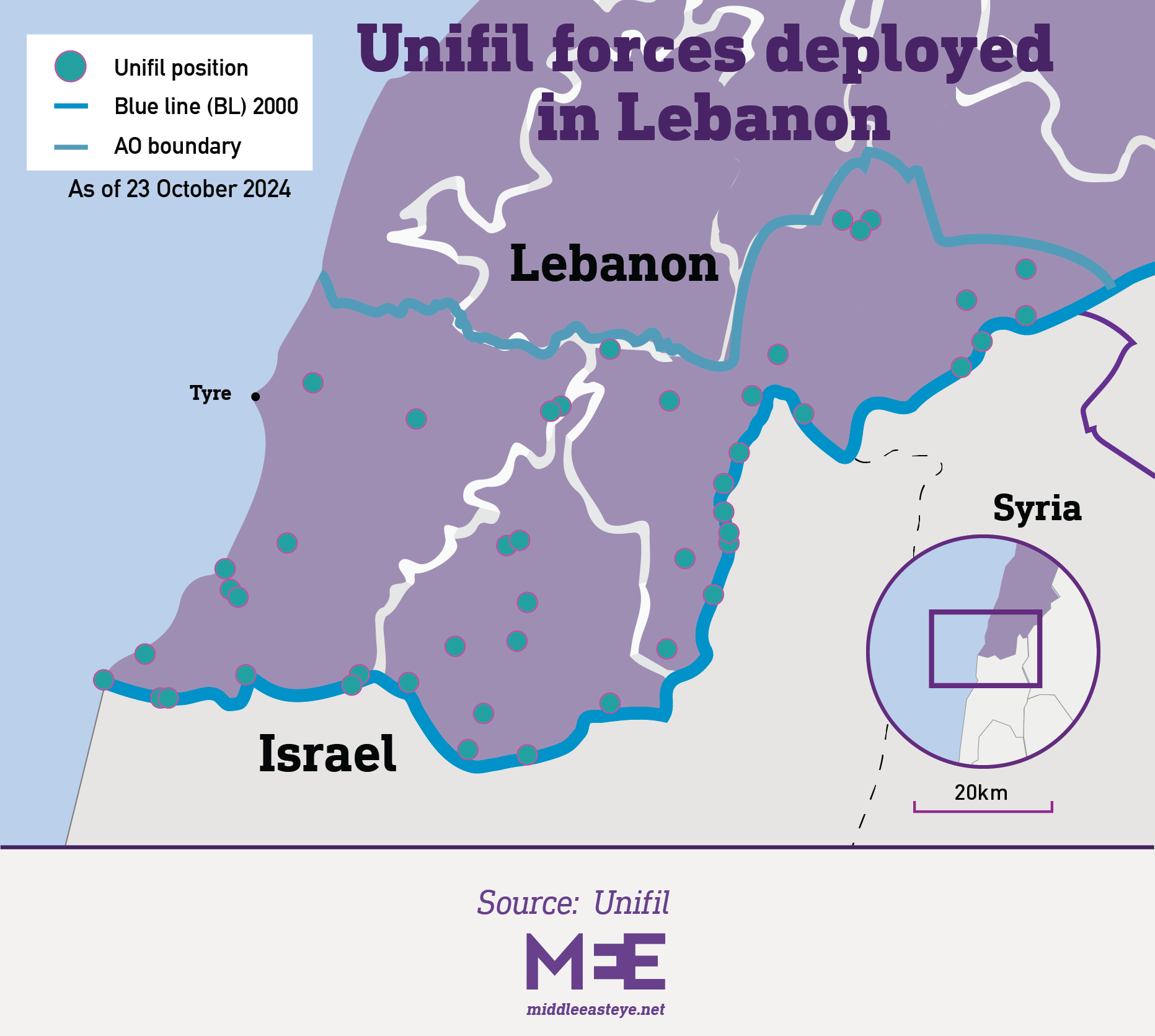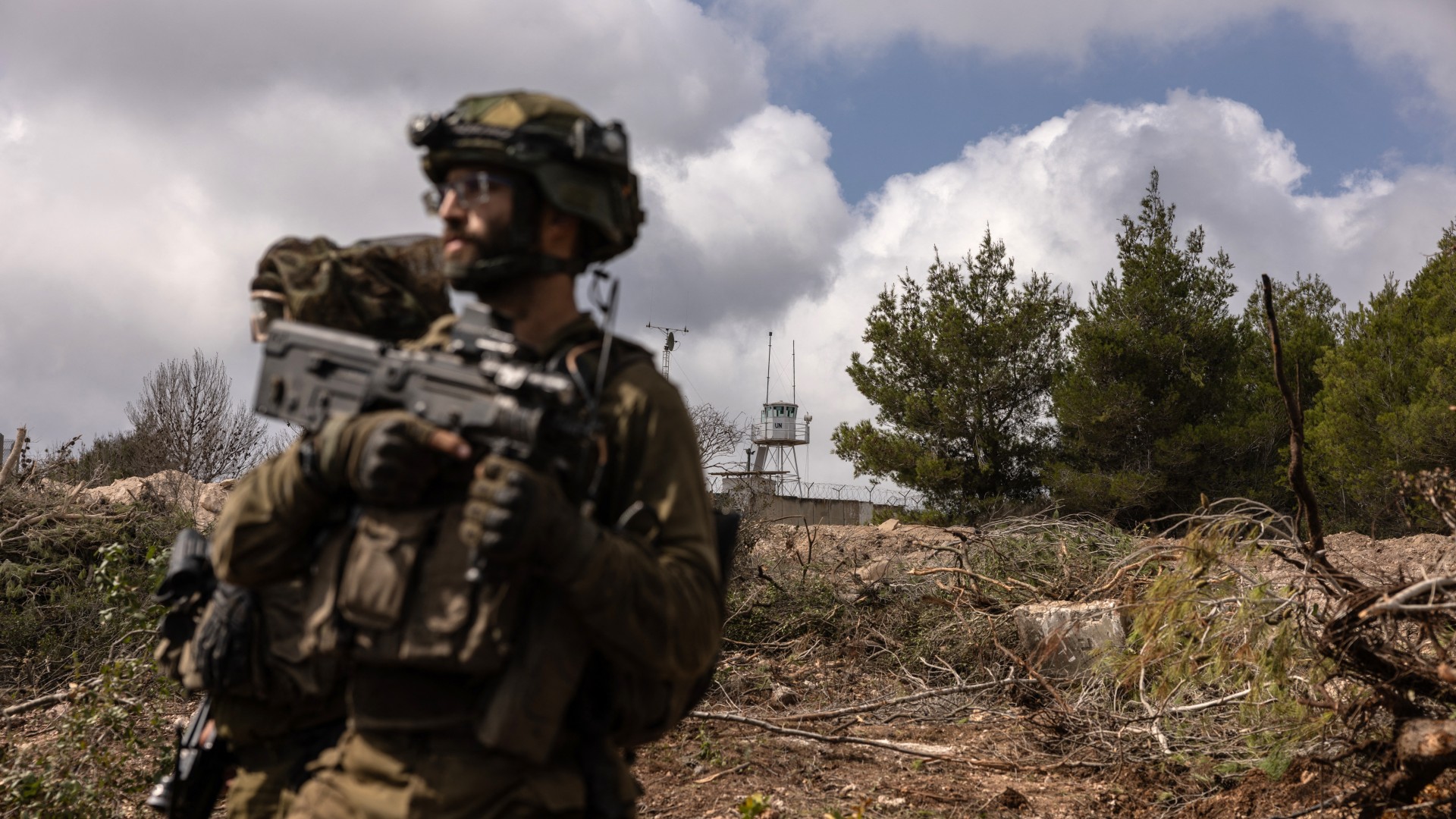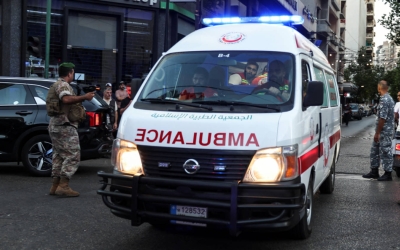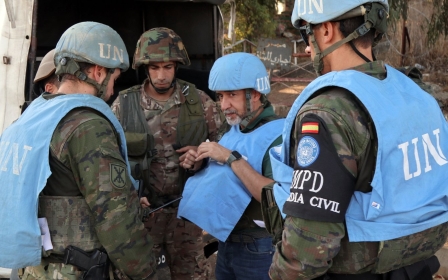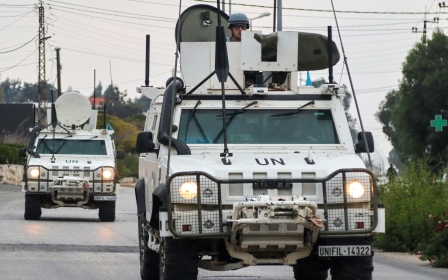Unifil attacks and Resolution 1701: Has Israel violated international law?
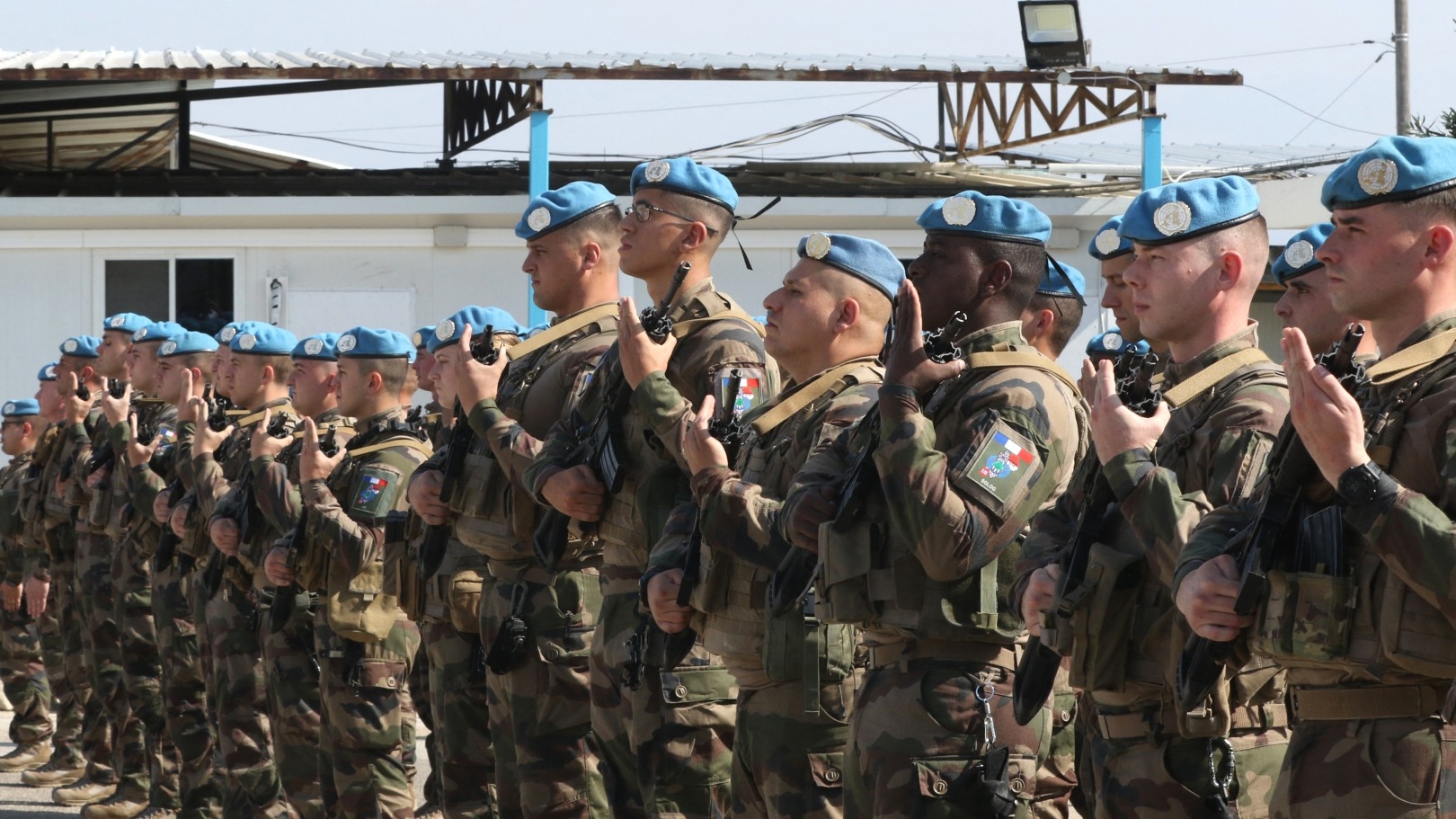
For nearly two decades, UN Resolution 1701 has been the primary legal framework for maintaining a 2006 ceasefire between Israel and Lebanon.
But the escalating Israeli-Hezbollah hostilities since 8 October 2023 and the latest ground offensive by Israel into northern Lebanon have raised questions on whether this resolution has any effect on the ground.
On Monday, US special envoy Amos Hochstein said that resolution 1701 could form the basis of a ceasefire agreement between Israel and Lebanon, but that additional measures were required to ensure its implementation by both sides.
"Both sides simply committing to [UN resolution] 1701 is not enough," Hochstein said during a visit to Beirut on Monday.
Meanwhile, the United Nations Interim Force in Lebanon (Unifil), the peacekeeping force tasked with implementing resolution 1701 on the ground, has accused Israel of breaching the resolution by directing multiple attacks on its troops in southern Lebanon since the beginning of its invasion of Lebanon on 1 October.
New MEE newsletter: Jerusalem Dispatch
Sign up to get the latest insights and analysis on Israel-Palestine, alongside Turkey Unpacked and other MEE newsletters
Below, MEE explains what resolution 1701 entails, Unifil’s mandate, and expert opinion on potential international law violations threatening the role of the peacekeeping forces in the area.
What is UN Resolution 1701?
Resolution 1701 is a UN Security Council resolution adopted unanimously on 11 August, 2006, aimed at ending the 34-day conflict between Israel and Hezbollah. The war killed an estimated 1,200 people in Lebanon, most of them civilians, and 160 in Israel, mostly combatants.
The resolution called for the immediate cessation of hostilities by both sides, and required the withdrawal of Israeli troops from southern Lebanon, with only the Lebanese Armed Forces and the United Nations Interim Force in Lebanon (Unifil) authorised to deploy to the area.
The resolution emphasised the need for Hezbollah and other armed groups in Lebanon to disarm, in line with previous resolutions, most notably UN resolution 1559, adopted in 2004. It also reaffirmed Lebanon's sovereignty, political independence, and territorial integrity, demanding that there be no foreign forces in Lebanon without the government's consent.
The resolution also strengthened the mandate of Unifil to assist the Lebanese government in securing the border and preventing the resumption of hostilities.
What is Unifil?
Unifil is a peacekeeping force created by UN Security Council Resolutions 425 and 426 in March 1978, following Israel's invasion of southern Lebanon.
Headquartered in Naqoura, Lebanon's southermost point, Unifil’s area of operations stretches along 1,060 square kilometres between the Litani River in the north and the Blue Line in the south.
The Blue Line stretches 120 kilometres (75 miles) from the Mediterranean coast in the west to the Golan Heights in the east.
The Blue Line is a boundary demarcation between Lebanon and Israel established by the United Nations in 2000 to verify Israel's withdrawal from southern Lebanon after its occupation from 1982 to 2000. It is not an official international border, but rather a temporary “withdrawal line” used to determine whether Israeli forces had fully withdrawn from Lebanese territory in accordance with UN Security Council Resolution 425.
Unifil’s initial mandate included: ensuring the full withdrawal of Israeli forces from Lebanese territory, facilitating peace in the volatile southern Lebanon region, helping the Lebanese government reestablish its authority over southern Lebanon, a region with numerous non-state armed groups.
After the end of the 2006 war, Unifil’s mandate was significantly expanded by resolution 1701.
The additional mandate included: monitoring compliance with the 2006 ceasefire; assisting the Lebanese armed forces (LAF) to ensure that the area between the Blue Line and the Litani river in southern Lebanon remained free of armed personnel and weapons other than those of the Lebanese government and Unifil; and helping ensure humanitarian access to civilians and the return of displaced persons.
Prior to 2006, Unifil had around 2,000 personnel. After resolution 1701, the force was expanded to around 10,500 troops from 50 countries to strengthen its ability to patrol the area and deter further conflict.
Seventeen percent of Unifil’s activities are carried out jointly with LAF.
Unifil’s mandate under resolution 1701 was also expanded to assist in preventing the transfer of weapons to Hezbollah and other non-state actors, as part of an arms embargo. However, the force does not have direct authority to disarm Hezbollah, and its ability to enforce the embargo has been limited.
In response to concerns about arms smuggling by sea, the Unifil Maritime Task Force (MTF) was created in October 2006 to patrol Lebanon’s coastline with the purpose of supporting the Lebanese Navy in preventing illegal arms shipments.
Unifil’s mandate is renewed annually by the UN Security Council, which voted to renew the mandate in August.
Can Unifil use force?
Unifil has a mandate to support Israel and Lebanon to ensure the cessation of hostilities, but it is limited in its capacity to engage in direct confrontations or offensive operations.
Unifil is authorised to use force in certain situations, primarity for self-defence.
Resolution 1701 authorises Unifil "to take all necessary action in areas of deployment of its forces and as it deems within its capabilities, to ensure that its area of operations is not utilised for hostile activities of any kind, to resist attempts by forceful means to prevent it from discharging its duties under the mandate of the Security Council, and to protect United Nations personnel, facilities, installations and equipment, ensure the security and freedom of movement of United Nations personnel, humanitarian workers and, without prejudice to the responsibility of the Government of Lebanon, to protect civilians under imminent threat of physical violence."
Have Israel and Hezbollah upheld resolution 1701?
Since the adoption of UN Resolution 1701 in 2006, both Israel and Hezbollah have violated its provisions on multiple occasions.
Unifil deputy spokesperson Kandice Ardiel said that while the Israeli army has carried out direct attacks on Unifil positions, Hezbollah’s rocket launches from nearby locations have put peacekeepers in danger.
Despite Unifil’s mandate to keep southern Lebanon free of unauthorised weapons, Hezbollah has rearmed and increased its military capacity, including the construction of underground tunnels and stockpiling of rockets.
Israel has criticised Unifil for being ineffective in curbing Hezbollah’s military build-up, accusing it of overlooking Hezbollah’s violations, especially the use of civilian areas for military purposes. Lebanon, on the other hand, accused Israel of breaching the resolution by its frequent violations of Lebanese airspace.
In the latest conflict, since 8 October 2023, UN Secretary-General Antonio Guterres said that the exchanges of fire between Israel and Hezbollah have directly breached resolution 1701.
According to Guterres, between 8 October 2023 and 30 June 2024, Unifil detected 15,101 trajectories, of which 12,459 were from Israel - south to north of the Blue Line - and 2,642 from Lebanon, north to south.
'While Hezbollah seemingly complied with resolution 1701, gradually over time it moved both its fighters and infrastructure back into Unifil's area of operations'
- David Wood, Crisis Group
One of the most frequent complaints from Lebanon and Unifil since 2006 is Israel’s repeated violations of Lebanese airspace.
Israel has routinely conducted surveillance flights over Lebanon, claiming these are necessary to monitor Hezbollah’s activities and arms smuggling. However, these flights are a violation of Lebanese sovereignty and the terms of Resolution 1701.
“It's clear that Hezbollah has breached UN resolution 1701 many times since the 2006 war. It's also clear that Israel has also breached the resolution many times since then,” said David Wood, Lebanon researcher at the International Crisis Group.
According to Wood, the most obvious example of Israeli breaches of the resolution is by conducting military flights in Lebanese airspace, which has been done repeatedly since 2006.
On the other hand, Hezbollah has been guilty of violating the resolution by deploying armed non-state actors south of the Litani River, he added.
“While Hezbollah seemingly complied with resolution 1701, gradually over time it moved both its fighters and infrastructure back into Unifil's area of operations,” said Wood.
However, the breach by either side does not justify attacks on the peacekeeping operations or attempting to force them to abandon their mission, he added.
“That would potentially set a very bad precedent for UN peacekeeping missions around the world,” he said.
What attacks has Unifil reported?
According to Unifil's Ardiel, the peacekeeping forces have been the target of about two dozen attacks in October, causing casualties and damage to UN property or premises. Most incidents could be attributed to the Israeli army, while the rest were of unknown origin, she told Middle East Eye.
The assaults include an Israeli tank attack on Unifil’s headquarters in Naqoura on 10 October, and another reported on 20 October that demolished an observation tower of a Unifil position in Marwahin. Several attacks also wounded peacekeeping personnel, including explosions near an observation tower in Naqoura on 11 October.
The Financial Times on Tuesday also reported that the Israeli military is suspected of forcibly entering a Unifil base on 13 October and using white phosphorus in close enough range to wound 15 peacekeepers.
Unifil has yet to confirm the incident. But Ardiel told MEE that 15 peacekeepers in Ramyah on 13 October “suffered symptoms after inhaling an unknown smoke”, which she said was released by the Israeli army.
"The smoke caused skin irritation and gastrointestinal symptoms,” she added.
“As we do not have testing capabilities, we are not able to identify what the smoke was.”
Moreover, in early October, Israeli forces set up a base adjacent to UN Post 6-52, which is staffed by Irish peacekeepers, a move the organisation denounced as an “extremely dangerous development,” suggesting it would compromise the safety of Unifil personnel.
The Israeli army has ordered several Unifil outposts to leave, including Irish troops, but the organisation and participating countries have refused.
“Our peacekeepers have a mandate to fulfill from the Security Council, and we will continue to remain in position as long as we have that mandate,” Ariel said.
Are the attacks on Unifil positions a breach of international law?
The attacks on Unifil positions may constitute a violation of the legally binding UN Resolution 1701, conventional law, and customary international humanitarian law, experts said.
First, Israel is not entitled to ask the UN to withdraw its forces under Resolution 1701, according to Alexander Gilder, a professor of international law at the University of Reading.
'Under international law, UN peacekeepers must not be deliberately targeted by any party to the conflict'
- Alexander Gilder, law professor
“Unifil is solely deployed to Lebanese territory and may remain in position as long as Lebanon continues to consent to the peacekeepers’ presence and the UN Security Council wishes for them to remain deployed,” he told MEE.
Likewise, Shane Darcy, a professor of the Irish Centre for Human Rights in the School of Law at the University of Galway, said trying to push out Unifil out of their areas of operations is outside the remit of the Israeli army.
“If the mandate of Resolution 1701 requires changing, that is a matter for the UN Security Council, and not for individual States acting unilaterally,” he told MEE.
Second, any attempt by the Israeli army to restrict the movement of Unifil troops and their operations would violate resolution 1701, said Gilder, since the resolution provides for Unifil’s freedom of movement within its designated areas of operation.
Third, attacks on UN premises may violate treaties to which Israel is a party.
On 10 October, Unifil said its headquarters in Naqoura and nearby positions had been “repeatedly hit” and that two of its forces were wounded after an Israeli tank fired at an observation tower at the headquarters, directly hitting it and causing them to fall.
On 13 October Israeli forces destroyed the front gate to a UN position and made forcible entry. According to Gilder, this was a violation of international law, because UN premises are inviolable under the 1946 Convention on Privileges and Immunities of the United Nations, to which Israel is a party.
Fourth, attacks on Unifil positions may constitute a breach of international humanitarian law, an opinion voiced by Unifil, the European Union, and several world governments.
“Under international law, UN peacekeepers must not be deliberately targeted by any party to the conflict. If they are deliberately targeted, that would be a war crime,” Gilder told MEE.
“Fire in the vicinity of peacekeepers that has led to injuries is not a violation of international law in the absence of evidence that UN personnel were targeted.”
Customary international humanitarian law, a set of unwritten rules that are binding on all states that have not objected to them, prohibits such attacks.
The International Committee of the Red Cross (ICRC) outlined these rules in its 2005 study of customary international humanitarian law.
According to Rule 33 of the ICRC study: “Directing an attack against personnel and objects involved in a peacekeeping mission in accordance with the Charter of the United Nations, as long as they are entitled to the protection given to civilians and civilian objects under international humanitarian law, is prohibited.”
Peacekeeping soldiers are treated as civilians under customary international law, because they are not members of either side of a conflict, according to the ICRC. They are entitled to the same protection against attacks as that accorded to civilians, as long as they do not take part in combat activities.
Middle East Eye delivers independent and unrivalled coverage and analysis of the Middle East, North Africa and beyond. To learn more about republishing this content and the associated fees, please fill out this form. More about MEE can be found here.


